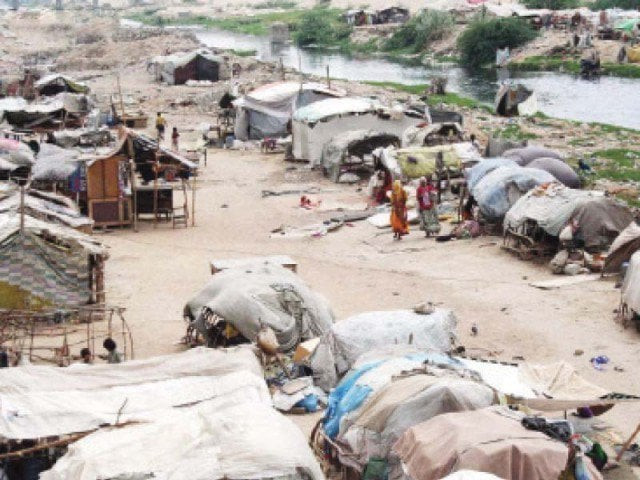Katchi abadis continue to grow as developers hijack city
Unregulated settlements weakening city’s infrastructure

PHOTO: FILE
This was observed by urban planner and architect Arif Hasan during a lecture on ‘Pakistan - Housing and People’ at the Shaheed Zulfikar Ali Bhutto Institute of Science and Technology (SZABIST). Hasan, marking the relationship between housing and people, uncovered how housing is the institutional arrangement of the population subjected by the government.
ABAD suggests significantly lower cost for 5m houses
Uneven settlements in the city are due to the government’s policies that have made it difficult for middle and lower income groups of the society to access the market.
The high-income and upper middle-income groups access the market through bank loans, developers and gated settlements whereas the low-income groups have location, availability and affordability issues.
This results in lower income groups living in katchi abadis, informal subdivisions of agricultural land and densification in existing settlements.
The urban planning structure has weakened during the last 50 years as Hasan remarked, “In the last 50 years in this profession, I had never seen people sleeping on pavements and sidewalks like today”. He highlighted one of the major issues of the weakening system as the inaccurate government statistics.
The statistics on urban planning given by different government institutions are so messy that they don’t even match one another, according to Hasan. He added that statistics are essential to plan housing and development schemes.
It was recorded that only 36% of people in Karachi live in planned settlements on 77% of the city’s residential lands while 64% live in informal settlements on 23% of the city’s residential lands.
“Developers have hijacked Karachi,” said Hasan, referring to the “so-called developments” that have caused serious social and physical repercussions for the city. The ecology of the region is damaged as expansion is vastly taking place over mangroves and green belt.
Further, Hasan spoke about how the dynamics of katchi abadis were changing in the city due to the changes in the nature of migration and settlements.
Nine children killed in Sukkur wall collapse
Katchi abadis are now located far from the city making them farther from commercial areas. The residents of these areas find it difficult to find work and cover the expenses of daily commute.
In response to the issue of lack of land availability, low-income groups carry out densification of existing katchi abadis that are closer to the city. Densification is changing informally built homes into multi-storey buildings. Karachi stands third among the most dense cities in the world.
Densification comes at a cost — smaller units, no elevators, issue of toilets, and emergence of gangs.
According to Hasan, lack of urban planning and development is severely affecting the city as standards of living deteriorate and maximum use of available land (density) causes residents to strive for basic utilities. It is essential to have the accurate statistics and technical training to make successful urban development possible.
Published in The Express Tribune, October 19th, 2018.



















COMMENTS
Comments are moderated and generally will be posted if they are on-topic and not abusive.
For more information, please see our Comments FAQ